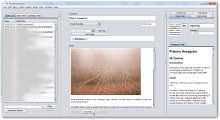People quite often ask me about the Yijing’s vocabulary of periods of time. But as I worked my way through them – seven days, three days, ten years… – I found one that I haven’t been asked about: a whole day. Just like seven days, three days and ten years, this one gets three mentions in the book:
‘Noble one creates and creates to the end of the day,
Hexagram 1, line 3
At nightfall on the alert, as if in danger.
No mistake.’
‘Boundaries of stone,
Hexagram 16, line 2
Not for a whole day.
Constancy, good fortune.’
‘The leaks are plugged with clothes of silk
Hexagram 63, line 4
For the whole day, on guard.’
It’s the same expression in each line, just preceded by a negative in 16.2: zhong ri 終日, literally ‘end (of the) day’ or ‘completing the day’, though zhongri is also a compound word meaning ‘all day long’. Zhong means the end, in the end, complete, all the way to the end – of a day or a lifetime – and also all the time, unceasingly. Early forms of the character show the ends of a single thread: when you’ve carefully unwound the full length of the silk thread from the cocoon, you’ve reached the end.
Isn’t it interesting that this expression should appear in hexagrams 1 and 63, at the very beginning and ending of the Yi?
1.3 to 10
‘Noble one creates and creates to the end of the day,
Hexagram 1, Creative Force, line 3
At nightfall on the alert, as if in danger.
No mistake.’
At the end of a full day’s creative work, the noble one is still vigilant, on the alert for change. (The components of the Chinese word are ‘heart’ and ‘change’, yi, the name of the oracle.) There are plenty of reading experiences where this is literally true: people staying awake and reflecting – or fretting – overnight. (Perhaps the idea is to do your worrying at night, and dedicate your days to creative work without stopping to worry.)
Shouldn’t we be asleep at night, though, like the wise noble one of 17’s Image? Well, in a time of Following, yes – but not when the Creative is on the verge of manifestation, and joined with the fierce energy of the tiger in Hexagram 10. The Zagua says that ‘Treading does not come to rest’, and nor does 1.3. After all…
‘To assume a cat’s asleep
Aileen Fisher
Is a grave mistake.
He can close his eyes and keep
Both his ears awake.’
The same is probably true of large, stripey cats, so perhaps it’s as well to stay alert at nightfall when treading close behind them. 1.3 is ‘no mistake’.
This line gives us a nice, clear introduction to zhongri: it’s all the time until nightfall, while the sun shines, the light lasts, and we can act.
16.2 to 40
‘Boundaries of stone,
Hexagram 16, Enthusiasm, line 2
Not for a whole day.
Constancy, good fortune.’
I wrote about this line before, when I was exploring ‘boundaries‘. In this line, I imagine the boundaries as enclosing rocks – containing, shaping, confining or protecting. However you experience them, they won’t last until the end of the day. The basic story of this line, as I understand it, is that your constancy can outlast the boundaries (even if they seem to have been there forever).
16.2 (like 42.6) is one of the lines expounded in the Dazhuan by a ‘master’ – Wilhelm thinks this means Confucius, but I prefer Karcher’s suggestion that these passages are excerpts from the readings of a master diviner. The explanations have the feel of a live reading, not just a philosophical reflection.
For this line, the master diviner says there is no need to let the day run its course if you understand incipience – if you ‘know the seeds’ of what is to come and can act on it without delay.
This fits elegantly at the intersection of hexagrams 16 and 40. There’s the anticipatory and imaginative power of Enthusiasm at work, pushing at the edge of what’s knowable – joining with the freedom of Release:
‘Release. The southwest is fruitful.
Hexagram 40, the Oracle
With no place to go,
To turn round and come back is good fortune.
With a direction to go,
Daybreak, good fortune.’
Hexagram 40 is never tied to an existing route, but can change direction promptly, as soon as the seeds are known.
The Dazhuan diviner doesn’t interpret the ‘boundaries of stone’ image, except to say that a noble one ‘understands the soft as well as the hard’ – what’s malleable as well as what’s set in stone, perhaps. Such a one, recognising the seeds of change, would realise that stone boundaries don’t last all day, and how things are now is not how they must always be. Hence he’s free to go either way – to turn and come back, or set out at daybreak.
‘Creating and creating to the end of the day,’ your activity lasts as long as the day; ‘not to the end of the day’ means your activity, your determination, can outlast the boundaries.
63.4 to 49
‘The leaks are plugged with clothes of silk
Hexagram 63, Already Crossing, line 4
To the end of the day, on guard.’
I wish I could say that ‘on the alert’ in 1.3 and ‘on guard’ here are the same word, but no – to be ‘on guard’ is jie 戒, having a weapon in one’s hands. The idea is not so different, though: as long as you are crossing the river, you might sink, and so to the end of the day, for as long as this activity lasts, stay on guard!
It’s plain why this belongs in Hexagram 63, Already Crossing –
Already across, creating success.
Hexagram 63, the Oracle
Constancy yields a small harvest.
Beginnings, good fortune – endings, chaos.’
As you move into the outer trigram, where you’ll start to see real-world results, you need to keep the chaos of endings (zhong 終) at bay.
The zhi gua is 49, Radical Change, a hint that this river crossing is part of the revolutionary fight, clearing out the old regime (the shredded silk clothes?) to bring in the new.
‘Radical change.
Hexagram 49, the Oracle
On your own day, there is truth and confidence.
Creating success from the source, constancy bears fruit.
Regrets vanish.’
I reckon the ‘whole day’ when you’re on guard is the same as ‘your own day’ when there is truth and confidence: the day of transformation, when everything is repurposed to keep you afloat so you can complete the crossing. Stay awake! Stand by to bale!
And so…?
Are these three lines connected? I think they are, at least by a shared theme of being constantly awake, alert and in touch with creative power and its changes. I certainly find that remembering 1.3 helps me to understand the other two lines.
Another connection that could help in readings –
How long is a day?
Like the other periods of time, this one could be taken literally in readings (if Yi needed to say ‘throughout today’, how else would it say it?), but it needn’t be. It also has the symbolic meaning of ‘through to the end, until the sun goes down on this phase of activity.’
In structural terms, I think the ‘end of the day’ might be the end of the hexagram. In each case, that seems to be a reasonable fit:
‘Noble one creates and creates to the end of the day,
At nightfall on the alert, as if in danger.
No mistake.’‘Overweening dragon has regrets.’
Hexagram 1, the Creative, lines 3 and 6
At the end of the day, at nightfall, there is danger for those who are over-confident or out of touch, as in the fan yao 10.3. Someone who failed to stay alert might well be have regrets.
‘Boundaries of stone,
Not for a whole day.
Constancy, good fortune.’‘Enthusiasm in the dark.
Hexagram 16, Enthusiasm, lines 2 and 6
Results bring a change of heart,
No mistake.’
At the end of the day, darkness falls, bringing results and a change of heart. But the protagonist of line 2, knowing the seeds, had no need to wait until the end of the day for the results to be fully manifest.
‘The leaks are plugged with clothes of silk
For the whole day, on guard.’‘Soaking your head. Danger.’
Hexagram 63, Already Crossing, lines 4 and 6
If you relax your guard before the end of the day, before the crossing is complete, then you may find yourself in over your head.











I just wanted to comment about hexagram 19 and my own mental health. In the midst of great adversity. I was getting treatment at a mental health facility. I was stuck. I got a breakthrough. I needed to stay quiet. Don’t speak. Hold your tounge. I was 25 yrs old at the time. Be QUIET!